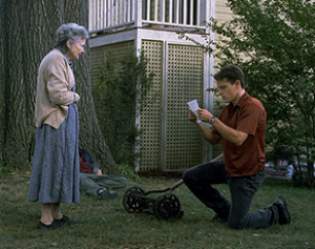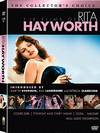





Teresa Wright
Biography | Filmography | Awards | Articles | Remembering | Bibliography | Gallery | News | Downloads | Links | Image Credits | THE LITTLE FOXES | MRS. MINIVER | SHADOW OF A DOUBT | THE PRIDE OF THE YANKEES | THE BEST YEARS OF OUR LIVES
| Article: |
Uneven Coppola movie gets one thing Wrightby Steven MazeyOttowa Citizen November 27, 1997 page G6
Even in a small role, Teresa Wright graces The Rainmaker. |
|
A more than a few critics have noted, Francis Ford Coppola's new movie The Rainmaker is uneven, a formula courtroom drama that's lifted by the performers and Coppola's assured style. But for movie buffs, there's one distinct pleasure in it: seeing Teresa Wright on the screen. If you're not a fan of old movies, the name won't mean much, but Wright who is now 79 and has a small role as an eccentric landlady in The Rainmaker, appeared in some of the finest films Hollywood produced in the 1940s, when she was one of the most winningly natural young actors on screen. Busy in Hollywood for more than a decade, she left to devote most of her career to the stage, with only occasional returns to the screen. But Wright was able to leave movie fans with a lot of fond memories. She had the luck to work with some of the leading directors of the day. Though she usually played wholesome, scrubbed ingenues, Wright brought an intelligence, a naturalness and a rich subtlety to her performances that was far beyond what you saw from other actors in similar roles at the time. Wright could play sweet, sincere and unspoiled without being simpering or gooey. If you've never seen Wright from her early career, take home any of the following: |
|
The Little Foxes (1941): it couldn't have been easy to make a movie debut next to Bette Davis, but Wright held her won in this adaptation of Lillian Hellman's play. "Miss Wright is a newcomer to the screen and is magnificent in a very difficult part as the daughter. A less talented actress in her place could have ruined the picture," said a Variety critic at the time. In this version of the play set in the American south at the turn of the century, Davis plays Regina Giddens, a woman who causes her husband's death and blackmails her shifty brothers in a scheme to get rich. Wright plays Regina's daughter, a vulnerable, innocent young woman who starts to become aware of her mother's nasty deeds and finally confronts her late in the film. |
|
Shadow of a Doubt (1943): One of Alfred Hitchcock's best movies, thanks to a script by Thornton Wilder, a wonderful ensemble cast and his usual deft mixture of comedy and suspense. There's also an authentic small-town feel, thanks to unusual (for the time) location shooting in a real California town. Wright plays a young woman who is bored with life, still living at home with her parents and kid brother and sister. An uncle she has always idolized (Joseph Cotten) comes to stay with them for a while. Before long, she starts to suspect that he is the serial killer being sought by police. He realizes that his niece knows about him, and Hitchcock brilliantly builds up the tension between the two. Wright and Cotten work beautifully together, and Hitchcock takes the film beyond simple suspense and into a look at innocence and disillusionment and the darkness that can hide behind facades. The excellent supporting cast includes Patricia Collinge as Wright's flighty mother and a young Hume Cronyn as the neighbor who is obsessed with crime stories. |
|
The Best Years of Our Lives (1946): Fifty years after it was made, scenes and attitudes may seem dated, but other things hold up beautifully in this William Wyler drama that was acclaimed at the time for the way it tried to look honestly at the stories of three veterans who return from the war and find life very different. Wright plays the daughter of one of the veterans (Fredric March), who finds it difficult to adjust to his grown-up children. Dana Andrews plays the soldier who falls for Wright after returning and discovering his wife has taken up with another man. Wright's character is a goody-goody meant to contrast too obviously with Andrews' wayward wife, but she again brings an intelligence to the performance that makes the character feel honest. © 1997 Southam Inc. |
|
Return to the Index
of Articles. |
| Now in Print! |
|---|
| Now on DVD! |
|---|
Buy Videos & DVDs |
|
Buy Movie Posters |
|
Buy Movie Posters |
|
Classic
Movie Merchandise |
|
![]() Printer-friendly version.
Printer-friendly version.
![]() Return
to the top.
Return
to the top.
Last updated:
March 10, 2011.
Reel Classics is a registered trademark of Reel Classics, L.L.C.
© 1997-2011 Reel Classics, L.L.C. All rights reserved. No
copyright is claimed on non-original or licensed material.
Terms of
Use.










